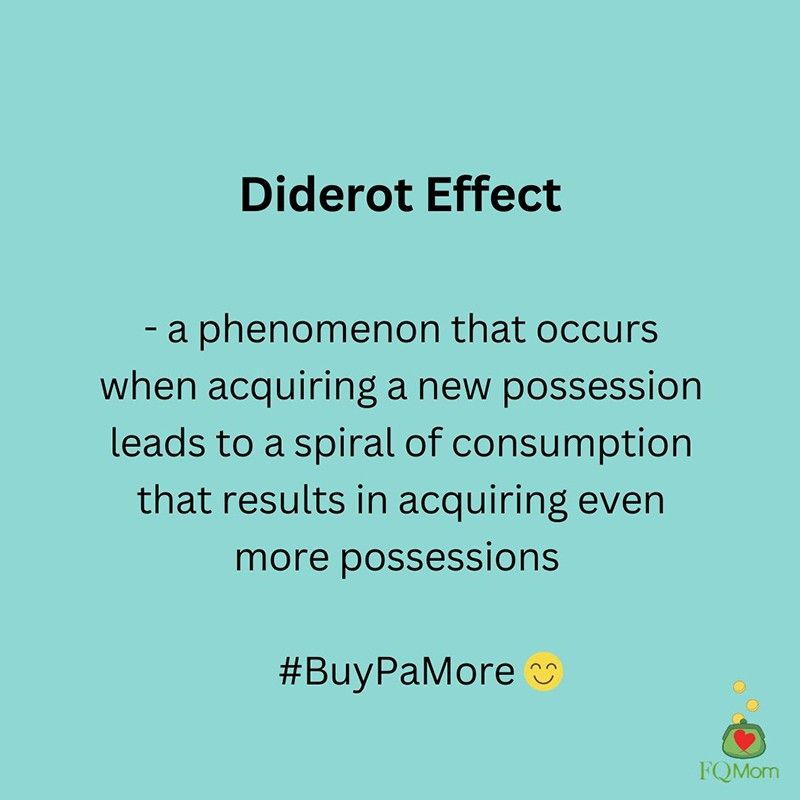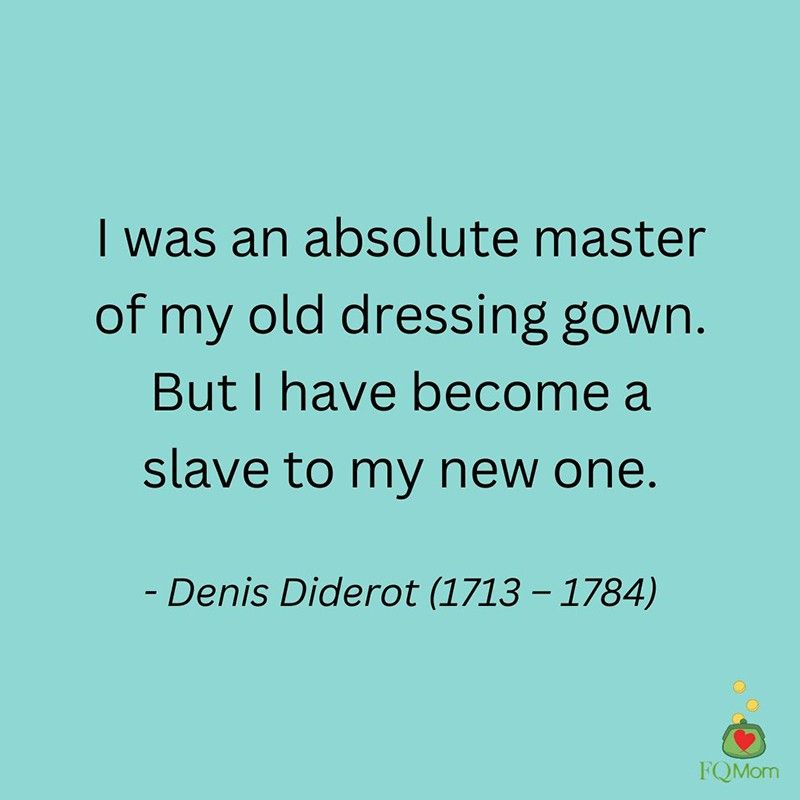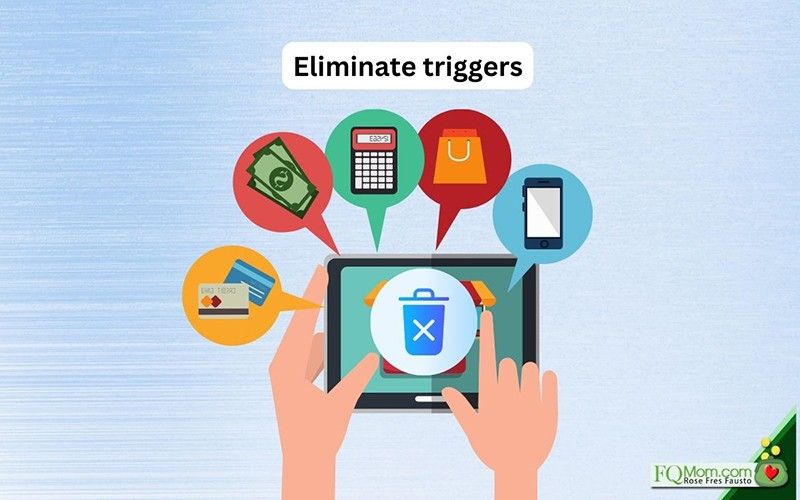Beware of the Diderot Effect (Note: We have all been afflicted with this)

What is Diderot Effect?
The Diderot Effect is a phenomenon that occurs when acquiring a new possession leads to a spiral of consumption that results in the acquisition of even more possessions. In other words, it means buying something new can cause a chain reaction of buying more and more things because the new item makes one feel the need to buy more things that will go with it.

History
Denis Diderot was a French philosopher, art critic and writer who co-founded the Encyclopédie in the 1700s. He struggled financially throughout most of his career and received very little recognition for his merit. In 1766, Empress Catherine the Great of Russia heard of his sorry financial condition and paid him 50,000 francs to serve as her librarian. The payment included the purchase of Diderot’s body of work which she will gain possession of upon the writer’s death.

Diderot described how having that much money affected him in his essay "Regrets on Parting with My Old Dressing Gown". Now with money to spend, Diderot purchased a beautiful scarlet gown that pleased him. It was so elegant and beautiful that he started to notice how his other possessions looked cheap and of poor quality that they no longer went well with his new possession. He replaced his old straw chair with an armchair covered in Moroccan leather, his old desk with an expensive writing table, his old prints with costly ones, and so on. All these purchases plunged him into debt.
In the same essay, he wrote a warning that’s worth remembering for all consumers: “I was an absolute master of my old dressing gown. But I have become a slave to my new one.”

Of course, Diderot did not coin the term Diderot Effect. It was coined by anthropologist and scholar of consumption patterns Grant McCracken in 1988 after Diderot’s experience documented in the latter’s essay.
The term Diderot Effect has been commonly used in discussions of sustainable consumption and green consumerism, reminding consumers how one new purchase or gift creates dissatisfaction with existing possessions, provoking a potentially spiraling consumption, if kept unchecked.
How to protect ourselves from the Diderot Effect
Let’s be honest, no one is immune to the Diderot Effect. A purchase of an Apple product that’s carefully designed to make you happy upon purchase can make you buy accessories that will go with it. Fixing a part of your house that needed repair can lead to a massive renovation, needing new pieces of furniture and appliances.
So, let us just try to protect ourselves from the adverse effects of the Diderot Effect. Here are some tips.

1. Be aware that it can happen to you or is already happening. The first step to solving any problem is to accept that there is a problem, or at least a potential problem. Before you embark on a shopping session, a renovation, or any new purchase for that matter, take a deep breath and admit that you are exposing yourself to the phenomenon. This is better than deluding yourself with, “I can control myself and will just stick to the original plan.”
2. Ask yourself these questions before buying:
a. Is this necessary? – If the answer is no, don’t buy it. However, if you remain “haunted” by it, ask the next question.
b. Do I really want it? If the answer is yes, ask the next question.
c. Why do I want it? Is it to make myself happy? Is it to impress someone? Is it to feel I belong to my group? After you’ve answered this set of questions, ask the next one.
d. Am I comfortable with my reason for buying this want? If you’re not, then maybe you can avoid the purchase. If you are okay with your reason, then ask the next question.
e. Can I afford to buy 10 pieces of this want? This is FQ Mom guideline to observing the third basic law of money.
3. Summon your makatwirang Mak to remind you of opportunity cost neglect. In FQ Book 2, we discuss this in Chapter 15 as the tendency to ignore what we give up when we make a choice as to how we use our money, time, and other resources. Ask yourself, “What am I giving up due to this additional purchase?”
4. Treat your closet or your house in general as prime real estate when making another purchase. Before you bring home any gadget, clothing, or other items, ask yourself if it deserves the space it will occupy in your home.
5. Buy 1 Give Up 1 or Give Up 1 Before You Buy 1. I have a friend who observes this in order to not crowd her closet. It’s not easy to follow this rule but it might be worth it, especially if you don’t have the space for more possessions.
6. Tap your creativity. If a new purchase makes you feel that you have to buy more, look at what you already have – be it your clothing accessories, pieces of furniture and decors. Sometimes, all it takes is repositioning or repurposing to give that new look.
7. Eliminate triggers. If it is difficult for you to resist shopping, remove the shopping apps on your phone, or at least put a barrier to them. If need be, unfollow personalities that trigger the “inggit” (envy) in you.

8. Know your true worth. If you take care of your self-esteem, it will be easier to avoid unnecessary purchases caused by Diderot Effect because you know that you will be just fine even without buying those items that can potentially get you broke.
I hope all of the above will help you avoid the perils of the Diderot Effect. Remember what Denis Diderot said, you should remain as the master of your possessions, and not the other way around.
ANNOUNCEMENTS
1. Having a high FQ helps you avoid the Diderot Effect. Check your FQ score by taking the FQ test. Click here.
2. Grab your copy of the FQ books, click here.
This article is also published in FQMom.com.
Attribution: Image from Logic Advisor and meisterdruck
- Latest




























